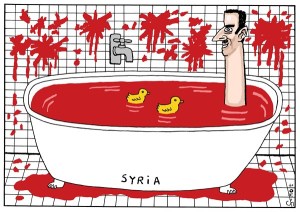“In my opinion, any future defense secretary who advises the president to again send a big American land army into Asia or into the Middle East or Africa should ‘have his head examined,’ as General MacArthur so delicately put it.”– ( Former Defense Secretary Robert M. Gates speaking to cadets at West Point)
Although over 60 percent of the American public oppose intervening in the civil war in Syria, President Obama has received a lot of pressure and criticism for not taking an aggressive position on the issue. Proponents for intervention most commonly cite terrorism prevention as the central reason to get involved. Some supporters also see the state of Syria as a humanitarian concern.
The problem with this advocacy is that it assumes this is both a black-and-white issue and that the rebels are wearing the white hat while President Bashar al-Assad is wearing the black hat, which is something President Obama realizes. He had previously stated that the use of chemical weapons was a red line, but hasn’t taken action after reports of chemical weapons. His reasoning is that the United States doesn’t yet know “how they were used, when they were used, who used them,” and further stated: “When I am making decisions about American national security and the potential for taking additional action in response to chemical weapons use, I have to make sure I have the facts.”
In a recent report, Carla Del Ponte, the veteran war crimes prosecutor and a commissioner of the U.N. Independent International Commission of Inquiry for Syria said that the Syrian rebels had likely used the nerve agent sarin. She explained, “Our investigators have been in neighboring countries interviewing victims, doctors and field hospitals and, according to their report of last week which I have seen, there are strong, concrete suspicions but not yet incontrovertible proof of the use of sarin gas, from the way the victims were treated.” And Del Ponte later added, “This was used on the part of the opposition, the rebels, not by the government authorities.”
One of the most prominent Syrian opposition groups is al-Nusra Front. According to the U.S. State Department, al-Nusra Front is a cover name for the division of al Qaeda in Iraq, which has been operating in both Iraq and Syria. Of all of the al Qaeda groups, al Qaeda in Iraq is the only one to have a history of using chemical weapons.
There have also been multiple reports of President Bashar al-Assad using chemical weapons. During his regime, the current Syrian leader has been accused of human rights violations, specifically of the secret police’s treatment of people who have spoken against the government and political opponents. A U.N. report stated: “Security agencies continued to systematically arrest wounded patients in state hospitals and to interrogate them, often using torture, about their supposed participation in opposition demonstrations or armed activities.”
It must also not be ignored that Syria is a religious country, and there are a mix of religious sects involved in this conflict. Al-Assad’s regime is Sh’ia, the most dominant of the rebels are Salafi, and the vast majority of Syria is Sunni. Interestingly, long before the civil war began, the al-Assad regime openly opposed Salafi ideology while building ties with Sunni groups and, in response, the Salafis had spent years organizing its current leading opposition.
The United States’ past military involvement in the Middle East has not been ultimately fruitful, as Iraq has not become the peaceful democracy that the past administration sold to the public. The 2003 American invasion sparked the death of Iraq as a cohesive nation, and present day Iraq is devastated with sectarian infighting. In just the month of April this year, the U.N. Assistance of Mission for Iraq said 595 civilians and 117 members of the Iraqi security forces were killed by acts of terrorism or general violence. Another 1,633 combined were wounded. The mission was not accomplished.
I think it would be wise to follow former Defense Secretary Robert M. Gate’s advice and not get militarily involved in Syria to try to solve this complicated problem. With the not long past memory of Iraq, it seems rather presumptuous to even assume that getting our military involved would be ultimately beneficial for the Syrian civilians. The war hawks have continually brought up the current death toll of 70,000 in Syria to prompt our involvement, but I wonder how many more deaths the United States would add to that number if our military also got involved in the violence. In Iraq, the American invasion resulted in over 100,000 deaths and in Afghanistan around 20,000 deaths have been recorded. It would be best to handle this issue carefully, and President Obama has acted accordingly. The United States and Russia plan to organize an international conference in Geneva to encourage peace talks between President Bashar al-Assad rebels.
EDITORS COMMENT: Angela’s analysis could have saved many lives and money if our decision makers had taken the time and been students of history; thinking before rushing into military action. This is a characteristic of both political parties. The public can easily be brought along by providing a bad guy aided by an anxious press interested in another source of news. One can analyze the results of our past military actions using cost- benefit analysis.



Thank you for that excellent article!
I don’t understand the pressure to participate in another war. Seems like the press and opposition politicians want to “catch” Obama not following up on the Red LIne quote. Not a good motivation for involvement in another war.
These are life and death decisions and our country can’t be so short sighted to think that we will prevail and bring order. Now they are even speculating that because we didn’t get involved the violence has escalated. Our involvement in Iraq and Afghanistan didn’t bring peace and order, but rather more disruption and death to those countries and their citizens.
The United States military isn’t the deciding factor for the outcome in another countries war, but once it is deployed it could take decades to get out of the mess and could have little effect besides providing a larger body count.